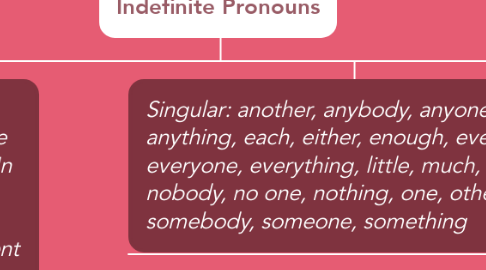Indefinite Pronouns
by Flower Reyes


1. Indefinite pronouns are those that are not specific, exact or definite. They are also used when the noun is unknown. In other words, they do not follow the same construction as most other pronouns, which replace the antecedent (the noun to which they refer). The pronouns themselves are the antecedents. Indefinite pronouns do not refer back to a particular person, subject or object. Most of these pronouns are either always singular or always plural, but there are a few that function both as singular and plural pronouns depending on the context of the sentence.
1.1. List of indefinite pronouns:
1.1.1. Singular
1.1.2. Plural
1.1.2.1. both, few, many, others
1.2. The uses of indefinite pronouns composed with "some", "any", and "no" in affirmative, negative and interrogative sentences are the same as the uses of "some" and "any". "Some" and its compounds are used with affirmative and interrogative phrases; "Any" and its compounds are used with negative and interrogative phrases; and "no" and its compounds are used only with negative phrases. For more information, see the lesson of quantifiers.
1.2.1. Is there anything I can do to help?
1.2.2. There isn’t anybody home.
1.2.3. Would you like something to drink?
1.2.4. Nobody wants to work today.
2. Grammatical Rules
2.1. Indefinite pronouns in singular always carry the verb in singular
2.1.1. Nothing was ever the same.
2.2. Somebody left their jacket. It’s so cold outside, I’m sure they will be back for it soon.
2.3. Cuando nos referimos a un pronombre indefinido, normalmente utilizamos un pronombre plural.
2.4. We can use the Saxon genitive ("-'s") with undefined pronouns of people and things to indicate possession.
2.4.1. Is this anyone’s seat?
